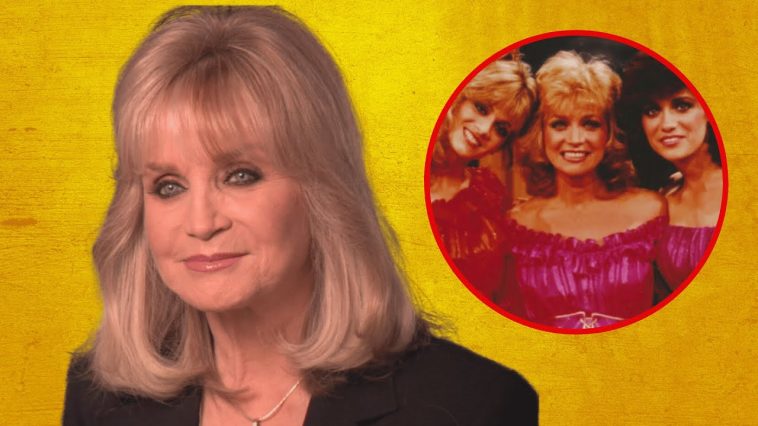Barbara Mandrell was one of country music’s biggest stars in the 1970s and 1980s. Along with her two talented sisters, Louise Mandrell and Irlene Mandrell, Barbara had great success not only with her music career, but also with The Barbara Mandrell Show variety series that aired on NBC from 1980-1982. The trio was known as Barbara Mandrell and the Mandrell Sisters and they wowed audiences with their stellar harmonies, musical versatility, comedy sketches and glamorous style.
During Barbara Mandrell’s peak years, she charted over 30 Top 10 hits on the country charts and earned numerous awards from the Country Music Association, Academy of Country Music and American Music Awards. Some of her most popular songs included “Sleeping Single in a Double Bed,” “(If Loving You Is Wrong) I Don’t Want to Be Right,” and “I Was Country When Country Wasn’t Cool.”
In this video, we will catch up with Barbara Mandrell, now 74 years old, as well as her sisters Louise and Irlene, and discuss exactly what happened to these famous country stars and talented sisters after their highly successful show ended in 1982. Did they continue having hit songs? What have they been up to lately? Viewers can expect to learn the answers to these questions and more about the Mandrell Sisters phenomenon that took over country music in the late 70s and early 80s.
Early Life and Musical Upbringing
Barbara Ann Mandrell was born on December 25, 1948 to parents Mary Ellen and Irby Mandrell in Houston, Texas. The eldest of 3 daughters, Barbara grew up in a very musical household. At age 6, the family relocated to Oceanside, California where Irby opened a music store. Mary Ellen taught young Barbara piano and accordion, while Irby gave her lessons on the steel guitar. Barbara quickly demonstrated prodigious aptitude on the complicated instrument, earning the nickname “The Princess of Steel” by age 11.
Barbara’s musical gifts secured her spots touring on the country circuit as a pre-teen with legends like Patsy Cline and Johnny Cash. Irby soon formed the Mandrell Family Band featuring Barbara on steel guitar, Mary Ellen on piano, Irby on guitar, and middle sister Louise learned guitar and bass. Youngest daughter Irlene joined in on drums and vibraphone. The Mandrell Family Band toured extensively, including USO shows entertaining troops abroad. This musical upbringing shaped the siblings into multi-instrumental child entertainers.
Barbara’s Early Recording Career
Barbara retired briefly from music after high school to start a family with new husband Ken Dudney. But while visiting Nashville’s Grand Ole Opry, she felt the pull to perform again. New manager and father Irby secured Barbara a record deal with Columbia where she released her first single in 1969—a cover of the R&B song “I’ve Been Loving You Too Long.” Though her early releases blended country, pop and soul, Barbara soon earned favor with tradition-minded country audiences by touring with stars like Johnny Cash and joining the Opry cast in 1972.
Now signed to ABC/Dot Records, Barbara broke through to mainstream popularity in 1978 with the #1 country hit “Sleeping Single in a Double Bed” followed by covers of classic R&B chart-toppers “If Loving You Is Wrong” in 1979 and “Years” by Ivory Joe Hunter in 1980. Barbara pioneered a flashy, dance-heavy concert approach featuring multiple costume changes, choreography and displaying her instrumental diversity on steel guitar, saxophone, banjo, bass and more. This country-pop fusion, showmanship and sassy songs about marital mishaps fueled Barbara’s meteoric rise.
The Mandrell Sisters Variety Show
Barbara’s national TV exposure expanded when she, Louise and Irlene began co-hosting weekly prime-time music and comedy variety show Barbara Mandrell and the Mandrell Sisters on NBC from 1980-1982. The trio’s sibling banter, glamorous style, musical performances and sketches portraying funny “character” versions of themselves brought country music into mainstream pop culture with record viewership. The relentless workload ultimately caused Barbara to walk away from the smash-hit program at the peak of its popularity.
Dominating the Charts, Concerts and Awards
Propelled by national TV exposure, Barbara became country music’s top female vocalist in the early 80s. She landed over 30 Billboard Top 10 country singles like “Crackers” and “Years” along with numerous #1 hits including “I Was Country When Country Wasn’t Cool.” Barbara still stands as the only woman besides Taylor Swift to win the CMA Entertainer of the Year award twice, taking the honor in 1980 and 1981 by attracting huge arena crowds with her polished, high-energy stage productions.
That chart domination reflected country music’s overall shift toward pop-country styles during the “Urban Cowboy” era. Always adventurous, Barbara’s recordings fused contemporary R&B and rock while still showing her Texas grit on rootsier album cuts. Respected as an artist and trailblazer, Barbara also won consecutive ACM and AMA Female Vocalist honors plus a Grammy for her gospel album He Set My Life to Music.
Surviving Tragedy
At the peak of her white-hot success, tragedy struck when a drunk driver collided head-on with Barbara’s vehicle in 1984 nearly killing her. That accident broke her leg, damaged her knee and left lasting back and ankle pain. Brain swelling caused temporary memory loss that altered her personality before eventually improving over subsequent years.
While Barbara recovered from those extensive physical injuries, she also endured the emotionally painful obligation to sue the deceased driver’s estate simply so her own insurance would pay medical bills. Though reluctant and regretful over the unwanted publicity, legal protections for accident victims left Barbara no choice. But that stress impacted Barbara’s reputation at a challenging time.
Persevering as Times Change
Displaying steely determination, Barbara fought back from near-devastation. Just 8 months post-crash, she began performing with Dolly Parton for a tour and relief concert. Barbara slowly rebuilt her vocal strength and physical stamina for entertaining. She landed several more Top 10 hits like “No One Mends a Broken Heart Like You” in 1986. Barbara signed new label deals as country shifted toward youth-focused neotraditionalists like Randy Travis and the Judds.
Barbara’s chart presence gradually faded by the early 90s, but she remained a popular touring headliner and made frequent TV guest appearances. Ever the savvy businesswoman, she became spokesperson for No Nonsense pantyhose in exchange for ongoing tour sponsorship. Barbara also nurtured acting chops with roles in films like Burning Rage plus episodes of Dr. Quinn Medicine Woman, Baywatch and Walker: Texas Ranger.
Graceful Retirement
In October 1997 at just 49 years old, Barbara Mandrell bid farewell from touring and recording. Despite drawing large crowds right up to that final performance which was made into the TV special The Last Dance, she yearned to spend more time with her children and focus on acting. True to form, Barbara held a flashy farewell concert spectacular to end her music career. She sold all instruments and quit performing entirely to mixed emotions from her fans.
Over the ensuing decades out of the public spotlight, glimmers of Barbara’s enduring star-power have emerged. In 2009 she was rightly inducted into the prestigious Country Music Hall of Fame. Various contemporary artists have consistently credited Barbara’s influence too, including crossover sensations Faith Hill, Shania Twain and Carrie Underwood. Entertainment moguls in Las Vegas attempted unsuccessfully to lure Barbara into headline residency shows as well given her show-stopping talents and trailblazing legacy.
Passing the Torch
While Barbara embraces quiet family life, the Mandrell legacy lives on through Louise and Irlene’s ongoing musical work plus Barbara’s autonomous Fontanel Mansion attraction. That sprawling log cabin estate where Barbara once lived is now a popular country music-themed hotel and event venue in Nashville featuring concerts, shooting sports, unique dining and more. Barbara’s story is also set to be revived for modern audiences thanks to a new Broadway-aimed musical called “I Was There When Country Wasn’t Cool” stemming from that signature song.
As today’s female artists enjoy paths paved by Barbara Mandrell’s barrier-breaking career, the Country Music Hall of Famer continues inspiring innovation even in retirement through both her inheritors and endeavors bearing the Mandrell name.
Louise & Irlene: Talents Beyond Barbara’s Shadow
Though Barbara Mandrell attained the greatest fame, sisters Louise and Irlene carved out fruitful music and entertainment careers in Barbara’s orbit. The Mandrell Family Band cemented tight-knit bonds between the siblings from early ages.
Middle sister Louise first toured playing guitar in Barbara’s backing band The DoRites during the 1960s/70s. Louise landed solo record deals playing country, jazz and big band tunes including over a dozen Hot Country Songs chart entries. Louise wrote two books, headlined her own theater show for a decade in Pigeon Forge, TN and still performs selectively when not operating her restaurant.
Youngest Irlene toured as Barbara’s drummer before shining on camera as both a model and comedic actress. Like Louise, Irlene charted a few minor country singles as well. Beyond the sisters’ hit 1980s NBC variety show, fans saw Irlene on other programs like game shows and Hee Haw for 8 years. Still hosting charity events, Irlene also enjoys hunting, racing cars and singing the National Anthem at public events.
That staying power proved crucial after Barbara’s retirement. Though fame fades, the trio’s recordings and memories sustain through Louise and Irlene’s ongoing work plus a Mandrell exhibit at the Country Music Hall of Fame and Museum in Nashville, helping cement the sisters’ rightful place in the genre’s history.
Their Legacy of Connection
While individual accomplishments made Barbara Mandrell a household name for a time, the warmth exuded between all three makes the Mandrells beloved. Early reviews praised their NBC show’s comical depictions of squabbling sisters with blameless familial chemistry that felt endearingly authentic. Barbara noted “I think there’s just something so nonthreatening about sisters… it was just a family show.”
Beyond topping charts, the Mandrells connected fans to universal experiences of sisterhood with harmony and good humor even amid chaos. Tennessean editor Kara Kennedy remarked while inducting Barbara into the Music City Walk of Fame, “They exuded an irresistible charm and graciousness…that made you instantly want to be part of their family.” Journalist Evelyn Shriver summed up their appeal by writing “Whatever they did, they did together.” That interplay persists through Louise and Irlene’s ongoing work.
So the Mandrells’ place in history springs not solely from their independent talents, but also an intangible sororal magnetism. Together they cast musical spells meshing boundary-breaking entertainment with the relatability of family ties. That potent combination of charisma and skill established the Mandrell sound and image as a cherished prime country-pop era hallmark.
The Mandrell sisters left a memorable mark showcasing country music’s broadening scope through their storied careers. While Barbara chose a quieter path after her many accolades, new generations continue discovering her catalogue thanks to digital streaming access.
Who do you think was country’s greatest female entertainer of the 1980s—Barbara Mandrell or someone else like Dolly Parton, Reba McEntire or Tanya Tucker? Let us know your pick in the comments! And as always, thanks for watching!



